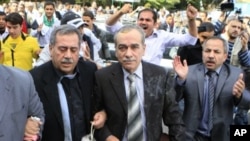The Arab League meets again Saturday to deal with Syria's broken pledge to end a crackdown on anti-government protesters. But, there are limits to external pressure.
Pressure is building on the Arab League to move decisively against the Syrian government, which has yet to keep a promise it made to the league last week to stop attacking civilians. Activists say more than 110 people have been killed since Syria announced it had agreed to the plan.
Doubts about diplomatic efforts were on display outside league headquarters in Cairo. Opposition members who want President Bashar al-Assad to step down reject the idea that dialogue still has a chance.
|
U.N. human rights chief Navi Pillay said Wednesday more Syrian soldiers are defecting to the opposition because they refuse to be complicit in international crimes. In remarks to the U.N. Security Council, she said there is a "serious risk" of Syria descending into the type of armed struggle that happened in Libya's popular revolt earlier this year. Earlier this week, the U.N. human rights office said at least 3,500 people have been killed in the Syrian government's crackdown on dissent since the uprising began in March. |
Anti-Assad demonstrators threw eggs at opposition members willing to talk Wednesday, barring most from entering the building.
But some outside league headquarters are willing to give the regional alliance one last chance.
"I call on the Arab League, if it cannot settle the matter this coming Saturday, to let go of the Syrian portfolio and refer it to the [U.N.] Security Council," said Syrian opposition coordinator Ghassan el Saleha.
It is not clear what more the league can do, but so far, it has been against international intervention.
Adib Shishakli, a member of the opposition Syrian National Council, spoke to VOA via Skype.
"I understand the Arab League concern," said Shishakli. "The way Syria is positioned, next to Iraq, next to Lebanon, next to Israel and Palestine. You're talking about a TNT box. I understand they are taking their time on the Syrian issue."
There is also a practical reason that, no matter how bad the violence gets, the league is reluctant to call for outside military force, as it did against another member, Libya.
Security analyst Anthony Cordesman said "Syria is a real military power. It has fought Israel again and again. It has long range missiles. It has chemical weapons. It has thousands of tanks that are active and can be used. Its armored divisions can really fight. And it has an air force, which if not anything like the capability of a NATO air force, is nothing like the Libyan force, which had almost no real capability."
No matter what happens at the Arab League or the U.N., opposition member Shishakli says outside force may not be necessary.
"The regime is not as powerful as it was," he said. "Yes, it's continuing its brutality against the people, we're seeing people getting killed every day, but I'm telling you today we are much closer to freedom than any other day. "
Still, demonstrators remain outside Arab League headquarters to keep up pressure for international action. But the Syrian government shows no sign of buckling, blaming much of the unrest on "terrorists."




